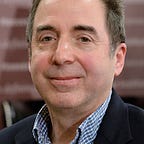Poems of My Father — #5
At Grass
The eye can hardly pick them out
From the cold shade they shelter in,
Till wind distresses tail and mane;
Then one crops grass, and moves about
- The other seeming to look on —
And stands anonymous again.
Yet fifteen years ago, perhaps
Two dozen distances sufficed
To fable them: faint afternoons
Of Cups and Stakes and Handicaps,
Whereby their names were artificed
To inlay faded, classic Junes —
Silks at the start: against the sky
Numbers and parasols: outside,
Squadrons of empty cars, and heat,
And littered grass: then the long cry
Hanging unhushed till it subside
To stop-press columns on the street.
Do memories plague their ears like flies?
They shake their heads. Dusk brims the shadows.
Summer by summer all stole away,
The starting-gates, the crowd and cries —
All but the unmolesting meadows.
Almanacked, their names live; they
Have slipped their names, and stand at ease,
Or gallop for what must be joy,
And not a fieldglass sees them home,
Or curious stop-watch prophesies :
Only the groom, and the groom’s boy,
With bridles in the evening come.
— Philip Larkin (1922–1985)
Larkin was one the rare modern or at least semi-modern poets that my dad really liked. Besides the quality of his poetry, I think my dad felt some kinship with Larkin’s cantankerousness and irreverence. My dad wasn’t big on ceremony or worrying about what other people thought about him, a trait that Larkin seems to have shared with his friend, Kingsley Amis.
I struggle to like most Larkin poems, but not this one. On the surface, it’s just an elegiac set of observations about two immortal race horses. The language, rhythm and subtle rhyme scheme (ABCABC) perfectly evoke the arc of their existence — from world-class competitors to the languor and grace of retirement.
The language is extraordinarily economical. Brim, fable, and almanac become verbs. “Artificed to inlay faded” is, I think, a reference to the trophies etched with their names. “Crops grass” is grazing. The “long cry” is the unhushed building roar of the crowd as the horses approach the finish line and when it subsides, it is replaced by a different cry in the newsroom of “stop the presses” — the newspapers delay printing to be able to include the results of the race just finished.
Larkin confesses to anthropomorphizing the race horses — wondering if they are plagued by memories, imagining the pleasure that comes from anonymity (they have slipped their names), suggesting that galloping is a source of joy rather than the work it might have been under the pressure of training under the burden of binoculars (fieldglasses) and a stop-watch. Seeing the horses through human eyes forces us to think of great human competitors and how such athletes cope with the quiet of retirement, a life where glory recedes and fades, where the near-anonymity of a much smaller stage may not be easy to accept, and where mistakes and regrets may complicate the savoring of memory.
For the horses, the coming of evening is simply a chance to be taken care of by the groom and the groom’s boy. You can almost hear the slow clip-clop of hooves on the stable floor as the horses come in for the night. A great athlete’s old age brings a more complicated set of relationships with caretakers, and a more complicated set of emotions as evening comes.
